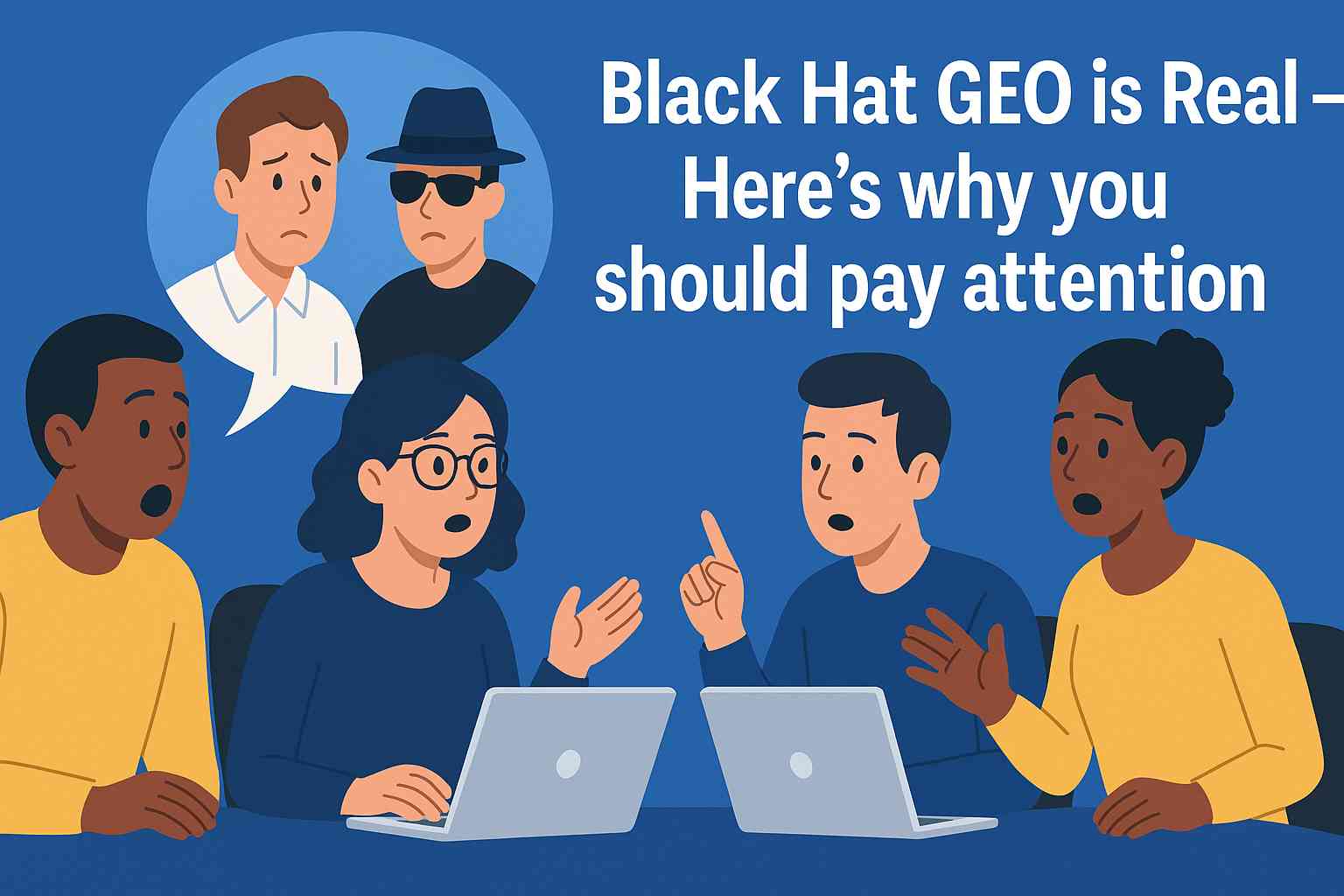Introduction
Ever noticed some low-quality websites suddenly showing up in AI-driven search results while well-optimized sites disappear? That’s not magic it’s black hat GEO at work.
In today’s SEO world, Generative Engine Optimization (GEO) is becoming the next big thing. But with it comes a darker side: unethical manipulation that can distort how AI systems find and rank your content. Understanding this is crucial if you care about visibility, trust, and long-term growth.
What is Black Hat GEO, and how is it different from traditional SEO?
Black hat GEO refers to the unethical methods used to influence AI search results or generative engine rankings. Instead of focusing on quality content, these tactics exploit how generative models read and cite information.
While traditional SEO focuses on Google’s algorithm (like backlinks and on-page optimization), GEO focuses on how AI systems interpret and summarize content in tools like chat-based search and AI-powered results.
It’s the same “black hat” mindset keyword stuffing, cloaking, fake mentions but now adapted for AI’s world.
Why should marketers pay attention to black hat GEO right now?
AI search engines are learning fast, and with that, new loopholes are opening up. Black-hat practitioners are exploiting these gaps to gain unfair advantages often pushing genuine creators aside.
Here’s why it matters:
- Search behavior is changing. More users rely on AI summaries instead of clicking results.
- Manipulative content can dominate those summaries and citations.
- Trust signals are harder for AI systems to verify, creating easy targets for abuse.
As generative engines become the new “front page” of the internet, ignoring GEO means missing the next wave of search visibility.
What are the common black hat GEO tactics to watch out for?
Let’s break down a few manipulative tricks happening behind the scenes:
- AI Cloaking: Showing different content to AI bots than to real users.
- Synthetic Mentions: Creating fake “authority citations” or pseudo-sources that generative engines pick up.
- Conversational Keyword Stuffing: Filling Q&A-formatted content with unnatural phrasing to trick AI models.
- Generative Engine Backlink Farms: Building low-value sites just to feed signals to AI discovery systems.
- AI-Focused Click Manipulation: Simulating engagement to appear relevant in conversational search models.
These tactics may offer a short-term visibility boost but will almost certainly lead to long-term damage once AI platforms tighten their trust filters.
How to defend your brand against black hat GEO
Here’s the good news: ethical, white-hat GEO still wins in the long run. Follow these best practices:
- Keep your content human-first. AI should enhance, not dictate, your message.
- Use clear structure. Generative engines love clean, question-based formatting.
- Focus on authority. Use verifiable facts, consistent tone, and brand voice.
- Don’t chase shortcuts. If a tactic feels shady, it probably is.
- Monitor AI visibility. Regularly check how your content appears in AI summaries and answer boxes.
As SEO expert Nina Lopez says, “GEO is not a replacement for SEO it’s an evolution. But ethics still separate leaders from opportunists.”
What happens if you ignore black hat GEO?
Ignoring it won’t make it go away. If competitors use unethical GEO tricks, your authentic content could lose ground in AI-driven search results.
You might notice:
- Drop in AI citation visibility.
- Decrease in organic traffic from generative search platforms.
- Loss of credibility if your content is misrepresented by AI outputs.
Long story short you don’t have to practice black hat GEO, but you do need to understand it.
FAQ
1. What does GEO stand for in SEO?
GEO stands for Generative Engine Optimization the practice of optimizing content for AI-driven search engines.
2. Is black hat GEO illegal?
Not legally illegal, but it’s unethical and can lead to deindexing, penalties, or total loss of AI visibility.
3. Can black hat GEO really impact organic SEO?
Yes. Manipulated AI signals can influence how your site is summarized or referenced, indirectly hurting your organic traffic.
4. What’s the difference between GEO and AI SEO?
AI SEO uses artificial intelligence for optimization, while GEO focuses on how AI engines themselves read and display your content.
5. How can I future-proof my SEO strategy?
Keep it human-centric. Follow ethical GEO practices, publish high-trust content, and stay updated through industry resources like iTech Manthra’s blog.
Conclusion
The era of Generative Engine Optimization is here, and so are people trying to exploit it. Black hat GEO may be new, but it’s real and if you’re serious about ranking in AI search, you must stay aware. Focus on content that helps people, not algorithms. That’s how your brand wins, even in this changing landscape.
If you’ve noticed unusual drops in your AI visibility or traffic, share your experience in the comments it’s time we all talked more openly about the hidden side of GEO.
